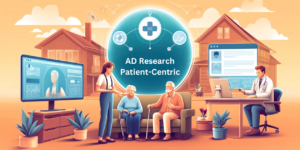The Methodological Issue Being Addressed
Most Alzheimer’s disease (AD) research focuses on early intervention and delaying progression beyond mild forms. Maintaining functional independence is vital for patients with AD, so measures of function are often included as endpoints in drug trials. However, current methods to assess functioning are episodic, burdensome, and fail to capture the daily challenges patients face.
Introduction
The FDA’s Patient-Focused Drug Development initiatives require new tools rooted in the patient experience. Measures of physical behavior, like walking, from wearable actigraphy sensors can show how patients function in real-world settings and aid AD drug development. These measures can capture mobility and daily functioning aspects that patients want to preserve. However, before using digital endpoints, we need to understand which functional aspects are meaningful to those with mild AD, the focus of many AD drug trials.
Thus, the study aims to (1) understand how mild AD impacts daily life and function and (2) identify health aspects measurable with low-burden wearable sensors.
Methods
We will conduct informational interviews with 8 older adults (≥65 years) who report a mild AD diagnosis. These interviews will explore patients’ views on how AD affects their daily routines and independent functioning. Participants will also discuss their concerns about future independence. Moreover, interviews will end with feedback on life aspects that should be included in future trials to better capture real-world functioning. We will analyze transcripts using grounded theory. We will code them to identify themes on AD experiences and independent functioning. Based on these themes, we will create a framework mapping patient experiences to health concepts and outcomes.
Anticipated Results
This study is ongoing. The poster will discuss benefits, challenges, and strategies in defining meaningful health aspects and identifying measurable functions for mild AD patients. Furthermore, we will present preliminary qualitative findings (n=5 anticipated). We hypothesize that maintaining walking behaviors and mobility will emerge as critical to independence. Consequently, patient experiences will determine the specific measurable outcomes. This data will guide future research on the validity and generalizability of our concept model. This model will form the basis for outcome development and regulatory qualification. Finally, the poster will also discuss how our approach to collecting patient experience data before trials can improve drug development and patient outcomes.
Conclusions
Our data will provide evidence to develop patient-centric digital endpoints for AD trials. Evaluating important daily living aspects and measurable digital health technologies is the first step in creating relevant tools for AD clinical development.


